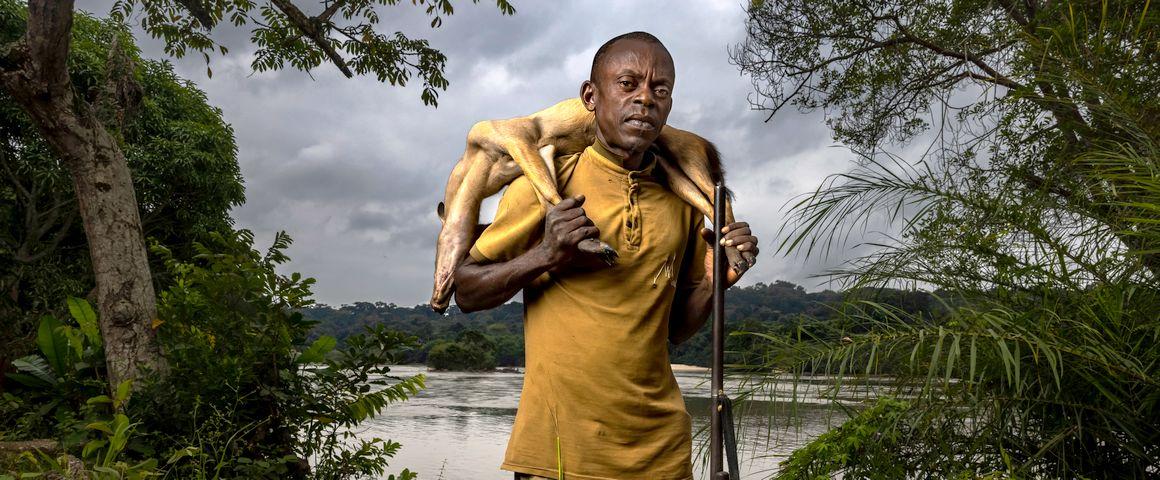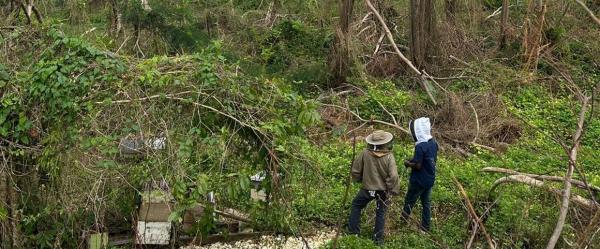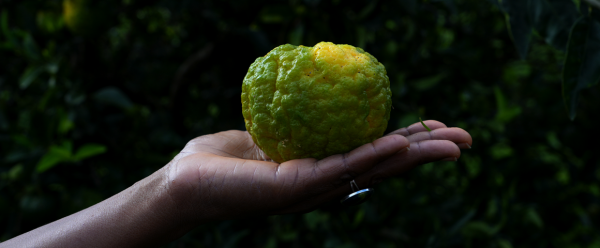Science at work 14 January 2026
- Home
- CIRAD news
- News
- A balancing act between wildlife conservation and food security
A balancing act between wildlife conservation and food security

DOUME VILLAGE, CLOSE TO LASTOURSVILLE, GABON, 29 JUNE 2021: Expert bushmeat hunter Nkani Mbou Mboudin is seen with an antelope he just shot hunting in the forest around his village. This village survives on fishing and bushmeat. Gabon has a sustainable bushmeat culture, largely because of its small population and large protected habitats. (photo by Brent Stirton/Getty Images for FAO, CIFOR, CIRAD, WCS)
Rooted in a holistic perspective of the importance of managing wildlife hunting at sustainable levels, the Sustainable Wildlife Management (SWM) Programme represents a shift from previous attempts to address the use of wildmeat for human consumption. The programme is developing and testing innovative community-led approaches in 15 African, Caribbean and Pacific countries. It’s being implemented by a consortium of partners that includes FAO, CIFOR and WCS.
Gabon is one of three countries where CIRAD is working to protect both wildlife and the food and income security of local communities – and the approach is already producing tangible results.
“Before, the main approach to tackling the disappearance of wildlife in the tropics, and especially in Africa, was to introduce strict conservation measures, with anti-poaching laws and criminalisation of people who hunted and consumed the meat,” said CIRAD ecologist Hadrien Vanthomme, Coordinator of the SWM Programme site in Gabon. “The SWM Programme seeks to find a balance between the need to preserve nature and the very important role that hunting and wildlife play in the food and economic security of local people.”
A broad range of expertise for a broad range of issues
Reflecting the diverse range of CIRAD and partners’ expertise, the initiative in Gabon has brought together ecologists, social scientists, economists, epidemiologists and legal experts to find solutions to the complex challenges linked to conserving wildlife and developing wildmeat as a sustainable source of food and income for local communities.
In this central African country, which has a relatively sparse human population and a rich diversity of animal life, the focus is on ensuring that local communities have legal rights to hunt wildlife for food, and the tools to do so in a manner that ensures the species’ long-term survival. A secondary future objective involves developing a sustainable value chain for wildmeat, which links hunters, processors, retailers and consumers around the small provincial town of Lastoursville.
The first pillar of this multi-pronged approach involves addressing governance issues. The law on hunting in Gabon is a legacy of the countries colonial past and is not aligned with the real needs of rural communities. Now, with support from the SWM Programme, a working group, chaired by the Ministry of Water and Forests of Gabon, is working on a National Strategy for Game Hunting and Trade to improve the legal framework for hunting and establish clear rights – and obligations – for hunters.
Meanwhile, on the ground, the team is working directly with communities and village hunters. In the forests of the Mulundu Department, efforts are under way to secure people’s legal rights to hunting, underpinned by the establishment of ‘community forests’ and a hunting management plan. Here, where local people have traditionally sourced part of their food from the abundant wildlife in 1600 km² of forests, they are now being trained to collect wildlife data and to operate camera traps to monitor animal populations.
Household surveys have been conducted to assess the views of consumers and hunters, as well as the levels of wildmeat consumption. Once processed and interpreted, the data goes back to the community, which is then responsible for deciding how the hunting management plan should evolve.
A crucial feature of the SWM Programme is that the communities are involved at every stage. In Gabon, when the project began, only four village groups agreed to participate, and it took time to build trust, recalls Vanthomme. “Then we were overwhelmed by demand from other villages and decided to extend the project. The site in Gabon now has ten village groups, and in each village, there is now an association that regulates hunting."
Setting up a surveillance system with local laboratories to limit the risk of zoonoses
A third and critical part of the strategy in Gabon involves working with local laboratories to set up a surveillance system designed to limit the risk of zoonoses infecting human populations through contact with wildmeat.
“Wildmeat is an open doorway for pathogens to enter communities. We have seen it with COVID-1 pandemic, Ebola and other epidemics,” said Hadrien Vanthomme. “We are trying to mitigate that risk by working together with several laboratories specializing in virology. The objective is to create a screening system that can rapidly detect pathogens and raise the alarm.”
A toolbox for community engagement
Ensuring community participation, ownership and leadership is an essential part of the SWM Programme approach. To that end, the initiative follows a community rights-based approach and has a series of social safeguards in place, which ensures that local and indigenous communities:
- participate and are included in an equitable manner in all project activities;
- are empowered in their legal use and sustainable management of natural resources; and
- can strengthen their capacity to manage and benefit from wildlife.
Social safeguards are new to the conservation sector and have rarely been applied in large-scale conservation projects.
“In Gabon, as everywhere, we are very careful about how we engage with communities,” explains Hadrien Vanthomme. “The series of social safeguards offers a framework or toolbox that we use when working with communities. These safeguards are designed to ensure that SWM Programme responds to the needs of the community, and that activities are defined and developed in a participatory manner with them.”
The social safeguards include five principles and tools:
- A community rights situation analysis
- The Free, Prior and Informed Consent protocol, a step-by-step approach that guide all the activities with local communities
- A six-step approach to achieve gender equality and women’s empowerment
- Research ethics
- A grievance redress mechanism
“Working closely with the communities is probably the most important feature of the SWM Programme,” said Patrice Grimaud, the CIRAD SWM Programme Coordinator in the KaZa site. “This set of tools goes a long way towards helping us to do this effectively.”



























